- Home
- Julia London
The Last Debutante
The Last Debutante Read online
Praise for New York Times and USA Today bestselling author Julia London’s “superbly entertaining”* series,
The Secrets of Hadley Green
“Cleverly crafted. . . . Dangerous intrigue and deliciously sexy.”
—Booklist*
“Gracefully unfold[s] with the perfect amount of tension.”
—Publishers Weekly
“Intriguing, touching.”
—Library Journal
“The strong plot and well-crafted characters envelop readers as the beauty of the romance sweeps them away.”
—RT Book Reviews
“A well-written, sexy, moving romance. . . . It’s almost perfect.”
—Dear Author
“Exciting and heart wrenching. . . . Julia London really won me over!”
—Romance Junkies
“An emotional and passionate roller coaster of a story.”
—Romance Reviews Today
“An excellent book. . . . Heartfelt and warming.”
—Fallen Angel Reviews
Thank you for purchasing this Pocket Books eBook.
* * *
Join our mailing list and get updates on new releases, deals, bonus content and other great books from Pocket Books and Simon & Schuster.
CLICK HERE TO SIGN UP
or visit us online to sign up at
eBookNews.SimonandSchuster.com
Contents
Chapter One
Chapter Two
Chapter Three
Chapter Four
Chapter Five
Chapter Six
Chapter Seven
Chapter Eight
Chapter Nine
Chapter Ten
Chapter Eleven
Chapter Twelve
Chapter Thirteen
Chapter Fourteen
Chapter Fifteen
Chapter Sixteen
Chapter Seventeen
Chapter Eighteen
Chapter Nineteen
Chapter Twenty
Chapter Twenty-one
Chapter Twenty-two
Chapter Twenty-three
Chapter Twenty-four
Chapter Twenty-five
Chapter Twenty-six
Chapter Twenty-seven
Chapter Twenty-eight
Epilogue
About Julia London
One
DUNDAVIE, THE SCOTTISH HIGHLANDS, 1811
JAMIE CAMPBELL WASN’T alarmed when the old woman pointed her gun at his head—he was galled. He’d ridden up to her fence and had just come off his saddle when the cottage door opened and she appeared with her blunderbuss.
He’d suffered more than his fair share of vexations these last few weeks. Things had gone to hell when his brother, Geordie, had called out Cormag Brodie and very nearly killed him. Not unreasonably, that had prompted Cormag’s sister Isabella, who was Jamie’s fiancée, to cry off their engagement. That was almost enough to drive a man to the nearest bottle of barley-bree, but to finish off that spectacularly bad event, Jamie then discovered that his uncle Hamish, who was losing a wee bit of his mind every day, had given away the money Jamie had managed to save in the family coffers. That money was all Jamie had to help support his clan, who had seen their livelihoods erode with the encroachment of Lord Murchison’s sheep onto their small parcels of land, and many had left for better occupations in Glasgow and beyond.
For the nine years Jamie had sat as laird of the Dundavie Campbells, he’d tried to lead them into the winds of change while holding on to as much of their way of life as possible. The Brodies were key to his plan, so it was all bloody well vexing—as was this woman and her gun. Jamie was descended from a long line of scrappy, argumentative Highland Campbells, men whose mettle had been tested at war, during famines, and in the throes of great change. They were not the sort of men to be put off by duels or broken engagements, or an old woman and her blunderbuss—which was shaking a little as she struggled to hold the thing up.
“There’s no call for that now, aye?” he said, pausing outside the gate. He held up both hands to show he was unarmed.
“As you are standing on my property, I’ll be the one to judge,” the woman retorted in a crisp English accent.
Sassenach. Mary, Queen of Scots, another one. Jamie’s hackles rose.
“What business have you here, sir?”
What business had he here? He was born and reared here, in these very hills. He knew them all, every path, every stream, every tree. What the devil was she doing here? Ach, he shouldn’t have come. He didn’t generally act in haste; at the very least, he should have brought Duff, his cousin and right hand, along.
But Old Willie had told him that the woman who lived in this cottage on Brodie lands was the one who had used Hamish so ill, and it had made Jamie feel a wee bit murderous. What sort of person took advantage of an old man who possessed only half his mind? Jamie was so intent on discovering the answer that he’d immediately ridden in the direction of the Brodie lands.
He sighed and looked at the neat little thatched-roof cottage. It was set back against towering firs on the edge of a small field where chickens wandered about, pecking at the ground. The cottage had been whitewashed and the fence recently mended, judging by the fresh yellow lumber. A wiggen tree, which superstitious Highlanders often planted near their cottages to ward off witches, shaded the front garden, and in one open window loaves of freshly baked brown bread were cooling.
It was idyllic, the sort of tidy vista that had lately brought Englishmen flocking to the Highlands.
The woman, however, was not what Jamie had expected. Old Willie had said she was English, but he’d not mentioned her gray hair or her rounded middle. Jamie had expected a vixen with a sultry gaze and curving figure, a woman who was a master at depriving men of their money.
This woman looked as if she ought to be waulking wool.
Jamie lowered his hands. “I am Jamie Campbell, Laird of Dundavie.” He waited for her inevitable gasp of alarm when she realized she had done the unthinkable by threatening a man of power and means.
She did not gasp. She hoisted her gun up a wee bit more. “That means naught to me. There are more Campbells roaming these hills than there are trees. Go on, then—off with you. I think it best you not be seen on this side of the hills,” she said. “The Brodies have no love for the Campbells.”
“The feeling,” he said, a little miffed that she would so eagerly embrace the Brodies’ side, “is entirely mutual. Nevertheless, I have come in search of a woman who has become financially involved with my uncle Hamish.” He cocked a brow at her, silently daring her to deny it.
“If you mean to imply that I am involved with him, I am most assuredly not.”
She was quick to deny it, wasn’t she? And a wee bit nervous, as well, which Jamie read as guilt. “Might I at least know to whom I am speaking?” He took a step closer, putting his hand on the swing gate.
“Stop! You are trespassing on my land!”
He snorted. “This land belongs to Gordon Brodie.”
“That,” she sniffed, “is but a small detail. He has let me this land, and therefore it is mine. Now please take your leave before I am pressed to defend myself in a most violent manner.”
If she thought she could shoo him away like a fly, she was mistaken. Jamie pushed the gate open. “Diah, for someone who claims no’ to be acquainted with Hamish, you are eager to see me gone, are you no’, then? Have you attended the pony races near Nairn?”
“I will shoot you if you come one step closer, and the Brodie boys who come round every Monday will cart your carcass off and toss it into the sea.”
“I’ve yet to meet a Brodie who was willing to expend that much effort. Much less one capabl
e of carting me anywhere,” he said brusquely. “Madam, I shall speak even more plainly. I am in search of the Englishwoman who lives in the cottage by the old Norse cairn.” He pointed grandly up the path he’d traveled from Dundavie to a crumbling old cairn plainly visible at the top of the hill.
He continued, “There are some who believe she has divested my uncle of one thousand pounds, a mighty sum. And while I would be the first to say a man is free to give his money to any lass he wants, I take issue when the man is no’ in his right mind. This is a man who forgets to belt his plaid and believes that he is the friend of an English lord who lives alone in the hills here. He canna remember the names of his children, yet he knows the names of the angels who visit him at night. Anyone who might take money from my uncle takes cruel advantage.”
Her cheeks reddened like a pair of apples; she cocked the trigger. “Leave me now, or die in the garden.”
Jamie frowned. He did not relish the thought of corralling an old woman and taking her gun. The best course of action was to return with Duff and a few of his men. “Very well,” he said with a shrug. “Perhaps you might be persuaded to recall your acquaintance when I bring a witness or two round to remind you, aye? Good day, madam.” He touched his hat and turned away toward his horse.
He heard the blunderbuss fire a split second before he felt the burn of lead enter his body. He fell, landing with a great thud, his head striking a rock—and then everything went black.
FUNNY HOW SMALL, chance moments could alter one’s world so completely. Daria Babcock had never really thought of it until now. She wasn’t generally one to contemplate fate or the meaning of life; she’d never engaged in such lengthy introspection. But then again, she’d never found herself on the side of a road in the Scottish wilds, utterly alone, until today.
Well. Not utterly, as there was a dog, but she hardly counted him. After her initial fear of being mauled when he’d wandered out of the forest, she’d quickly discovered him to be completely useless. He was black, with spots of white on his paws and his chest, and presently had folded his legs to lie beside her trunk, his head propped against it, his eyes closed, as if he had no more pressing issues to attend to than his nap.
Mr. Mungo Brodie hadn’t seemed particularly concerned when he’d deposited her here—he’d mentioned only that her destination was “just a wee bit up the road, then.”
That “road” was little more than a rabbit trail. Into dark woods. With not a soul in sight.
Daria glanced up to the treetops and the robin’s-egg-blue sky. She guessed it was the middle of the afternoon, which meant she still had a bit of time before it turned dark.
Which in turn gave her more time to study the ridiculous twists of fate that had brought her here. For her current predicament—side of road, all alone—clearly deserved some study. “I wish I knew the moment that everything changed,” she said aloud.
The dog’s ear twitched.
Perhaps it had begun a month or so ago, when she was feeling rather cross. It had seemed to her that a veritable explosion of births had occurred in and around Hadley Green, and that scores of pink-cheeked cherubs in carriages were being pushed about by their nurses as their gurgling laughter drifted in through open windows.
On one particularly sobering afternoon, she’d attended tea at the Ashwood estate, where she’d been gobsmacked at Lady Ashwood’s coy announcement to the assembled group of Hadley Green ladies that she was expecting her second child.
“A child!” Lady Horncastle, the grand dame of Hadley Green, had swiveled her silver head around to squint at the fair-haired Lady Ashwood through her lorgnette, clearly as stunned as Daria. “But you were only just delivered of your son, my dear,” she said, as if Lady Ashwood might rethink her pregnancy with the startling news that she already had a child.
Lady Ashwood had blushed and laughingly said, “I remarked the same to my husband, but I think he will not be happy until every room at Ashwood is occupied by a child.”
“That is quite a lot of children,” Lady Horncastle had sniffed. “Your husband is surely aware that if one desires a herd, one may invest in cattle. It is really much simpler.”
The announcement had made Daria quite cross, too. She desperately wanted a baby of her own, even a herd of them. Every time Daria held a baby she felt an uncomfortably deep tug in her chest. She would like to be married, to be a mother, a wife, to have some purpose other than to attend teas. Yet in spite of having spent the last three years endeavoring to put herself in every conceivable avenue of society, she had not even a whiff of a proper marriage prospect. That wound was being liberally salted by the fact that all of her close acquaintances were now married and bearing children, and on that particular day, it had sent Daria drifting onto a sea of melancholy.
She was the last debutante of Hadley Green. The last one of her social circle, the last one without an offer.
Daria had drifted home on that sea, but it was no better there, for she had the misfortune of living with two constant reminders of what was missing from her life. Her parents were like two cooing doves, forever in each other’s company, content with their own society. Daria often felt as if even she were intruding on their secret little world. At times she was touched by their devotion to one another, but at other times, she was annoyed by it.
When Daria had arrived home from the tea, she’d found her parents huddled together before the hearth in the salon against the chill of an early spring day, their heads bent together over a letter. Daria had thought nothing of it.
“I will admit,” she said, holding up one gloved finger to the dog, “that there are times I am entirely distracted by my own pathetic state of being.”
He gave her a single thump of his tail.
It wasn’t until supper that Daria had even noticed the subtle change in her parents. The evening lacked their typical effusive commentary on their blissful day.
So Daria had filled the air with a recitation of events from that afternoon, eager to relieve herself of her vexations. However, she was not rewarded with an appropriately commiserating response to her complaints of having no prospects or hope for a future. She’d sighed loudly to demonstrate her exasperation as Griswold, their butler-groundskeeper-footman-valet, lumbered about the table, removing their soup bowls.
“Is anyone listening?” Daria demanded.
“Of course!” her mother said. “You were saying, dearest?”
“That my life is not to be borne, that’s what,” Daria said a bit missishly. “And that you and Pappa might take me to London for the Season,” she added hopefully.
“Oh, I think not,” her father had said, his attention on the plate Griswold placed before him.
“Why not?” Daria had asked, stung by the swiftness of his dismissal. “It’s not as if I have any prospects here.”
“We are not suited to London,” her mother said. “And you do have prospects, darling. Lord Horncastle is very attentive to you—”
“I should rather perish than marry Lord Horncastle! I am aware that Horncastle is the only gentleman in Hadley Green with a fortune, but it does not make up for his odious tendencies to drink and pout!”
Yet her mother had smiled thinly and said with great condescension, “You will find a nice young man when the time is right, dearest.”
“The time is far past right, Mamma. I am one and twenty! Am I to waste away in this tiny little village without an occupation? I feel restless and useless.” She could almost hear her good friend Charity Scott whispering in her ear: “The point is that here in Hadley Green, you are without true society. There might be members of the Quality milling about from time to time, but the real society is in London. You must go to London.”
“You are very useful to us,” her father had objected.
Daria had groaned. She loved her parents, of course she did. She was their only child, and they’d doted on her all her life. If they had one failing, it was that they did not concern themselves with the proper way things were d
one. They were quite content with their private life and seemed to think Daria should be just as content. “Really, Pappa, what woman is not married at my age?”
Her father had shrugged thoughtfully. “Charity Scott is not.”
Yes, well, Charity was not married because she’d borne a child out of wedlock years ago and refused to name the father. “Charity said her brother, Lord Eberlin, would give me a proper letter of introduction, and that one could put oneself at the top of society with such a letter. Charity said that all one must do is wedge her foot firmly in the door, and the rest is up to her.”
“It would seem Miss Scott is a font of knowledge about town,” her mother had mused.
Daria had looked at her mother, and then her father, who was gazing at his wife with such concern that Daria felt herself on the verge of shrieking to the heavens for someone, anyone, to listen to her. It was just as she’d said to Charity that very day: no one understood how bleak her situation was.
She’d looked at her parents, thoroughly exasperated. “All right,” she’d said firmly. “You must tell me what is the matter. Why are you both acting so strangely? And what is the letter you are holding in your lap, Mamma?”
“Your mother has received a bit of unwelcome news,” Daria’s father had said.
“Richard!”
“She’s not a child, Beth. You can’t hide it from her.”
“What has happened?” Fear began to bloom. “Is it Mamie? Has something happened to Mamie?” she demanded, referring to her grandmother.
“Yes,” her father said.
“No!” her mother cried at the same time. “No, she is very well, Daria.”
“But the letter is from her,” Daria had pressed. “And she has told you something that has distressed you.”
“I don’t want to trouble you with it—”
“For God’s sake, Beth,” Daria’s father had said. Then to Daria, “Mamie is in a bit of financial difficulty. But it’s nothing that a few pounds won’t remedy straightaway.”
Daria might have believed that was true had her mother not bitten her lip to keep from speaking. “I don’t understand. She’s needed money before and it hasn’t distressed you like this.”

 A Royal Kiss & Tell
A Royal Kiss & Tell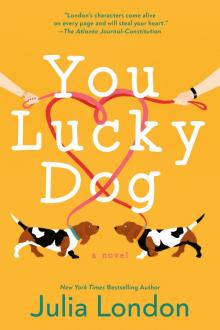 You Lucky Dog
You Lucky Dog The Devil in the Saddle
The Devil in the Saddle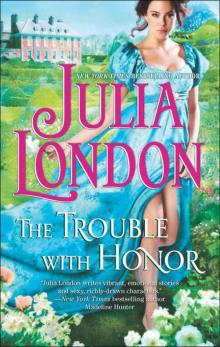 The Trouble with Honor
The Trouble with Honor Tempting the Laird
Tempting the Laird The Secret Lover
The Secret Lover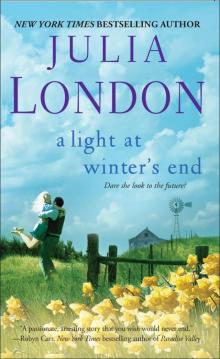 A Light at Winter’s End
A Light at Winter’s End The Charmer in Chaps
The Charmer in Chaps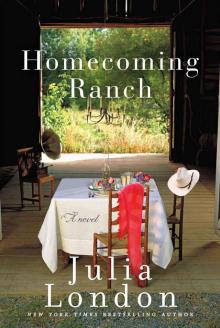 Homecoming Ranch
Homecoming Ranch Jack (7 Brides for 7 Soldiers Book 5)
Jack (7 Brides for 7 Soldiers Book 5)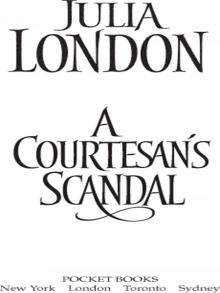 A Courtesan's Scandal
A Courtesan's Scandal Hard-Hearted Highlander--A Historical Romance Novel
Hard-Hearted Highlander--A Historical Romance Novel The Complete Novels of the Lear Sister Trilogy
The Complete Novels of the Lear Sister Trilogy The Last Debutante
The Last Debutante Suddenly Single (A Lake Haven Novel Book 4)
Suddenly Single (A Lake Haven Novel Book 4) Seduced by a Scot
Seduced by a Scot Highlander Unbound
Highlander Unbound Suddenly Dating (A Lake Haven Novel Book 2)
Suddenly Dating (A Lake Haven Novel Book 2)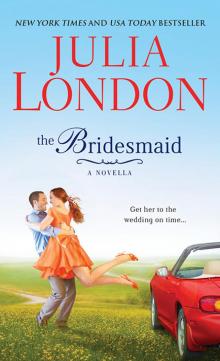 The Bridesmaid
The Bridesmaid The Seduction of Lady X
The Seduction of Lady X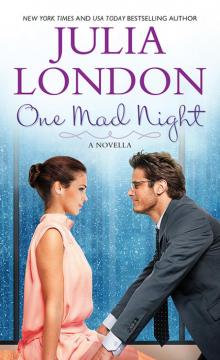 One Mad Night
One Mad Night Extreme Bachelor
Extreme Bachelor The Scoundrel and the Debutante
The Scoundrel and the Debutante The Revenge of Lord Eberlin
The Revenge of Lord Eberlin American Diva
American Diva The Lovers: A Ghost Story
The Lovers: A Ghost Story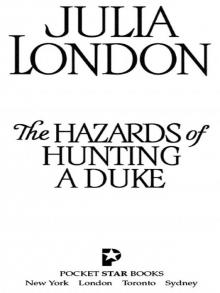 The Hazards of Hunting a Duke
The Hazards of Hunting a Duke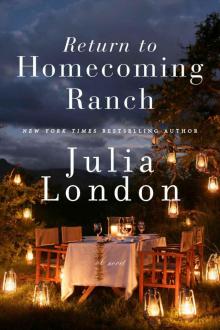 Return to Homecoming Ranch (Pine River)
Return to Homecoming Ranch (Pine River)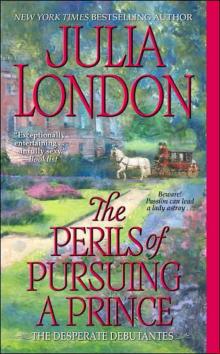 The Perils of Pursuing a Prince
The Perils of Pursuing a Prince Highlander in Love
Highlander in Love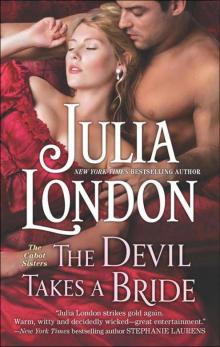 The Devil Takes a Bride
The Devil Takes a Bride Devil in Tartan
Devil in Tartan Wild Wicked Scot
Wild Wicked Scot Snowy Night with a Highlander
Snowy Night with a Highlander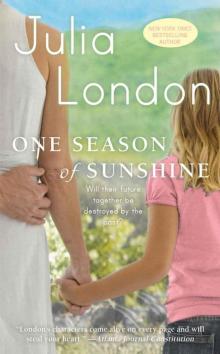 One Season of Sunshine
One Season of Sunshine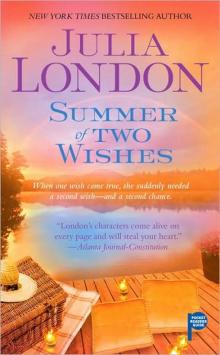 Summer of Two Wishes
Summer of Two Wishes All I Need Is You aka Wedding Survivor
All I Need Is You aka Wedding Survivor Sinful Scottish Laird--A Historical Romance Novel
Sinful Scottish Laird--A Historical Romance Novel Suddenly Engaged (A Lake Haven Novel Book 3)
Suddenly Engaged (A Lake Haven Novel Book 3)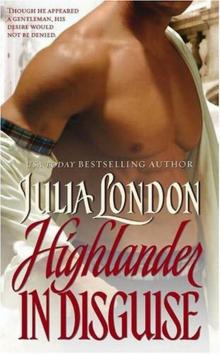 Highlander in Disguise
Highlander in Disguise Suddenly in Love (Lake Haven#1)
Suddenly in Love (Lake Haven#1)